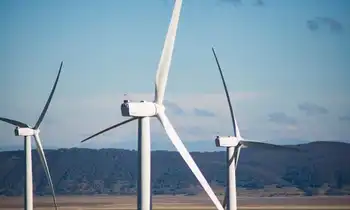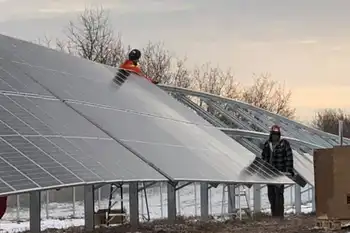EPA says Senate utility emissions bill too costly
BILL TARGETS 4 POLLUTANTS - WASHINGTON - The Bush administration said on Thursday it opposes a Senate plan to drastically cut U.S. electric power plant air emissions because the proposal is too costly and could harm national security.
The Senate Environment and Public Works Committee met to consider a controversial bill proposed by Vermont Independent Jim Jeffords, the committee chairman who has pledged to push a hard-line emission cut starting in 2002 through the Senate. But armed with a new Environmental Protection Agency analysis of parts of Jeffords' plan, the administration and Republican committee members raised a wall of opposition.
The EPA study said Jeffords' proposal would boost U.S. consumers' electricity rates by up to 50 percent. It could also harm national security by spurring power shortages as coal-burning utilities were forced to shutter plants that emit too much pollution.
``We believe the emission reductions and timing in the bill will be too costly for consumers and will endanger national security,'' said Jeff Holmstead, assistant EPA administrator.
``The administration strongly opposes including C02 (carbon dioxide) reductions in any multi-pollutant bill,'' he said.
BILL TARGETS 4 POLLUTANTS The Senate plan would target a 75-90 percent reduction in sulfur dioxide, nitrogen oxides, mercury and carbon dioxide starting in 2002, with full compliance by 2007.
The administration favors replacing current Clean Air Act rules with a cap-and-trade regime for nitrogen oxides, sulfur dioxide and mercury -- and no mandatory cuts for carbon dioxide.
That kind of market-based approach would allow dirty U.S. power plants to buy emission rights from cleaner plants. Green groups criticized the EPA report for downplaying environmental benefits and focusing on consumer costs.
The report ``exaggerated what the impacts might be on electricity prices'' from the Senate bill, said Jeremy Symons of the National Wildlife Federation.
Rather than add to costs, carbon dioxide reductions could boost the U.S. economy by $16 billion by 2010, Symons said. EPA's study disregarded the estimated human health and environmental benefits of $75 billion by 2010, he said.
The National Environmental Trust said it was trying to obtain earlier versions of the EPA report.
NO KYOTO ALTERNATIVE Jeffords and California Democrat Barbara Boxer took the administration to task for failing to draft a concrete alternative to the 1997 Kyoto global warming pact.
While world leaders gather in Marrakesh, Morocco, to discuss implementing Kyoto, ``the largest emitter, the United States, will sit idly by without a plan,'' Jeffords said.
President George W. Bush rejected the Kyoto plan in March because of its high compliance costs and potential drag on the U.S. economy.
Jeffords' plan could have a similar effect, Republicans warned. It could open a Pandora's box of ill affects on U.S. consumers and the electric power industry, they said.
Opposition is especially strong in Midwest and western states, which are heavily dependent on coal-burning plants.
Ohio Republican George Voinovich called the bill ``a disaster'' for manufacturers. The Senate bill would ``put the coal industry out of business,'' he said.
The plan would hit consumers with higher electricity prices, which in turn would hurt the economy, Voinovich said.
The proposed limits on utility emissions would reduce the U.S. gross domestic product (GDP) by 0.8 percent, or about $100 billion, in 2007 and by 0.3 percent, or just over $50 billion, in 2020, according to testimony from the U.S. Energy Information Administration (EIA). Meeting the carbon dioxide cuts in the plan account for the majority of those costs, EIA said.
DRASTIC CHANGES TO ENERGY PROFILE The Senate bill would also dramatically shift the nation's energy production away from coal-fired generation and toward cleaner sources like natural gas and nuclear, EIA said.
Coal use would fall by 25-30 percent by 2020. Natural gas use would climb by nearly as much, EPA said, ``which would tend to drive up natural gas prices.''
``We believe that these effects are not only unacceptable but unnecessary,'' EPA's Holmstead said.
The Edison Electric Institute (EEI), the industry's biggest lobbying group, said its utility members would consider cutting pollutants, but that the Senate bill goes too far.
``We can do more but if this is going to make it through the Senate we've got to back off on the numbers that are in the Jeffords bill,'' an EEI spokesman said. ``There is general consensus that some type of multi-emissions approach is preferable to the piecemeal approach to regulation to which we are subject now.''
Related News

Trump's Pledge to Scrap Offshore Wind Projects
WASHINGTON - During his tenure as President of the United States, Donald Trump made numerous promises and policy proposals, many of which sparked controversy and debate. One such pledge was his vow to scrap offshore wind projects on "day one" of his presidency. This bold statement, while appealing to certain interests, raised concerns about its potential impact on renewable energy development and environmental conservation efforts.
Trump's opposition to offshore wind projects stemmed from various factors, including his skepticism towards renewable energy, concerns about aesthetics and property values, and his focus on promoting traditional energy sources like coal and oil. Throughout…




